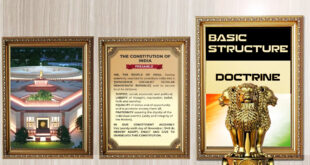Over the past few days, there have been expressions of concern in various fora over a few clauses of the National Medical Commission (NMC) Bill, now enacted. Even medical professionals have protested. According to media reports, there are five primary concerns. These pertain to the National Eligibility-cum-Entrance Test (NEET)/National Exit Test, empowering of community health providers for limited practice, regulating fees for only 50% seats in private colleges, reducing the number of elected representatives in the Commission, and the overriding powers of the Centre.
On examinations
First, a focus on the examinations. For the past few years, a separate NEET is being conducted for undergraduate and postgraduate courses. In addition there are different examinations for institutes such as the All India Institute of Medical Sciences and the Jawaharlal Institute of Postgraduate Medical Education and Research. This Act consolidates multiple exams at the undergraduate level with a single NEET and in turn avoids multiple counselling processes. NEXT will act as the final year MBBS examination across India, an entrance test to the postgraduate level, and as a licentiate exam before doctors can practise. It aims to reduce disparities in the skill sets of doctors graduating from different institutions. It would also be a single licentiate exam for graduates across the world. Thus, the government has in effect implemented a ‘One-Nation-One-Exam’ in medical education.
Second, concerns have been expressed over the limited licence to practise for community health providers. We have to appreciate that even with about 70% of India’s population residing in the rural areas, the present ratio of doctors in urban and rural areas is 3.8:1; 27,000 doctors serve about 650,000 villages of the country. A recent study by the World Health Organisation shows that nearly 80% of allopathic doctors in the rural areas are without a medical qualification. The NMC Act attempts to address this gap by effectively utilising modern medicine professionals, other than doctors in enabling primary and preventive health care. Evidence from China, Thailand and the United Kingdom shows such integration results in better health outcomes. Chhattisgarh and Assam have also experimented with community health workers. Further, the Act requires them to “…qualify such criteria as may be specified….” thereby ensuring quality.
In a nutshell
While some sections of people have sought to create a negative perception about select clauses of the Act, they have not highlighted other features. The Act establishes the Diplomate of National Board’s equivalence to NMC-recognised degrees — a long-pending demand. It also promotes medical pluralism. Then, there is a paradigm shift in the regulatory philosophy from an input-based, entry barrier for education providers without corresponding benefits, to its becoming outcome-focused. Both the number of doctors and their skill sets are expected to improve. Autonomy to boards and segregation of their functions will avoid a conflict of interest and reduce rent-seeking opportunities. And ‘quacks’ are liable to face imprisonment or be fined or both. The Act ends inspector raj.The efforts of successive governments have now culminated with the NMC Act replacing the IMC Act. There is no denying that medical education needs continuous reforms in order to usher in improvements in health care. There cannot be just one solution. The NMC Act is a serious attempt to meet the primary need of more medical professionals in the country; it is a beginning.
Sumant Narain is a civil servant and ex-director, NITI. The views expressed are personal
Check Also
Joint Parliamentary Committees (JPCs): Scrutinizing the Executive
Introduction In a parliamentary democracy, ensuring accountability of the executive is paramount. Joint Parliamentary Committees …
 Chinmaya IAS Academy – Current Affairs Chinmaya IAS Academy – Current Affairs
Chinmaya IAS Academy – Current Affairs Chinmaya IAS Academy – Current Affairs



